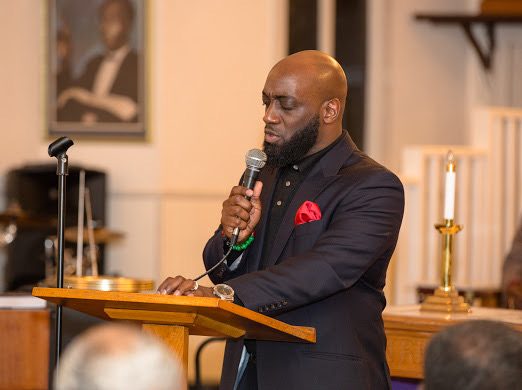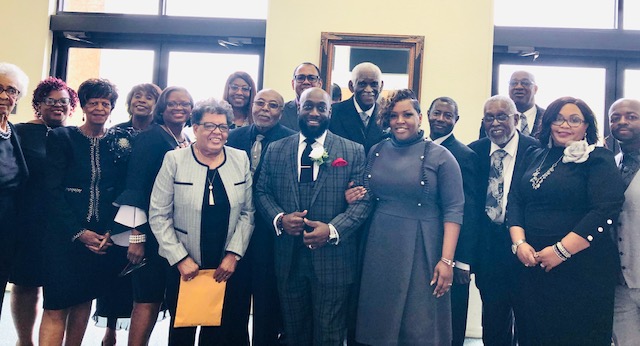
I parked and knocked on the back door at College Hill Missionary Baptist Church on a chilly and gray spring afternoon. I was greeted with a grin and let into the fellowship hall by a young man, who I would later learn is Rodney Lawrence, the Rev. Rodney Curry’s youngest child. Rev. Curry had conducted a graveside service just hours earlier, where folks spread out, practicing social distancing.
In our conversation, Rev. Curry talked about preaching in an almost empty sanctuary, connecting to his congregation online and by phone and what he hopes for College Hill members through coronavirus and beyond. At the end of the interview, Rev. Curry walked to the piano and treated me to a hymn, “How Great Thou Art.” You can hear it here.
Here is his story in his own words, edited for clarity and length.
“At first, this coronavirus was just a headline in the papers. Now, it has become our reality. You have to look at what the CDC is recommending. We trust in God, we know we are going to be fine. We rest on that, there is no fear there. But we want to make sure we exercise wisdom. I’ve had a chance to talk with numerous pastors. Some decided to close, some didn’t. I said ‘Hey, we support you either way it goes. But as for me, I have to do what I believe God has charged me to do concerning our church.’
The third Sunday of March 15 was that last Sunday [that the full congregation was in the building]. We had a great blast. The spirit of the Lord was here. We quickly moved to make some changes. We decided after much prayer, and I do mean much prayer [to close our doors]. I agonized, going back and forth.

We have quite a few elderly. We’re looking at maybe 30% or 40% that are 60 and above. We call them senior saints. I want to make sure we’re not putting them into harm’s way.
When we shut down March 15, it really kind of hit home. People were like ‘Wow, this is no longer hundreds of miles away from this, this is right here.’ I had a lot of nervous energy Sunday morning. I was down the hall, like before you play the football game. I was saying ‘let’s go’ and trying to pump myself up and praying. You have to have your own inner joy. God is the audience whether the congregation is or not. I’d rather have him than anyone else.
Now the people that came, I said, ‘I’m gonna need your amens.’ They were very responsive. We had our musicians, and it was still a jubilant service. My online Sunday sermon was “In God We Trust.” That’s all you need. He’s gonna be with you. I encourage them to keep their trust in God, not the government, not the stimulus package.
We’re live-streaming through our Facebook page. We had 3,200 views last time. We’re doing our conference call line as well. Every Wednesday at 6 a.m., we get up, even if I’m on vacation or somewhere. We get up and we have prayer and a scripture. I ask them to mute their phone, and they join me on the line. It’s a way midweek to connect and get some strength and energy.
[For] morning prayer, we used the free conference calling line, but the capacity is 100. We have plans to upgrade to another line that would give us the capacity to handle more callers. We have been teaching on prayer, and wow, now we have stored up some timber because now, we’ve had to rely on God even more so during this coronavirus. We have a consistent prayer life that we’re teaching the people. Even if I may not lead it, they understand the importance of prayer. We’re praying for the doctors, for the people on the front lines, those infected already, those that don’t know they have it. We’re praying God’s will be done.

If I can’t see them, I can certainly pray for them. Every Tuesday is my time of prayer for the entire church. I have the church roster. You call their names, every member, active and inactive. My dad did that. He started preaching when I was six years old. Sometimes he couldn’t say goodbye before school because he would be already praying on his knees. I think that was passed down to me.
We’re able to call every member with an automated message. I had a newsletter that went out to everyone and a video as well, just to keep everyone informed. Ways that they could keep themselves healthy. With children being home all day, you gotta get out and exercise, not just watch TV.
Members call and let us know how they are being impacted by this. We have some small business owners. In Dallas, they have shut down hair salons and barber shops. Now, what does that mean for [our members]? Most of them are still working and then the kids are out of school.
I haven’t been able to go into the nursing homes. We had a gentleman pass away, and I was able to go in with full gown, mask, gloves, feet. They only gave me clearance because I was a pastor and because our member was in hospice care. But the rest of my hospital visits as of last week have been denied. Members having surgery, you can’t go, even the family members can’t. My hands are withered. I think I could help a doctor wash their hands by now. We’re taking a lot of extra precautions. I can’t wait until the Lysol comes back because we’re going through those cans, with my little trigger finger.

Now, with the changes, the funeral homes are still trying to comply with all of this, so we’re moving to graveside services. We had a graveside today where people were spread out having scripture and prayer, a song and a committal. Everyone that passes through in this era and is not able to have a church funeral, we’re going to commemorate them and have a memorial when we’re able to come back together. To honor them with their picture and salute them with their families, to have dinner for them.
You have to show love from a distance and drop off the food. But when we get back, I can’t wait to honor them. The family, they mourn, but it’s kind of muted with the other things that come up. You have this litany of rules, and you have to choose your best options. We were giving elbows today. You can’t really embrace people like you want to. Sometimes they need a hug but we [refrained] as a concern and out of love.
I want them to know it’s more serious than we think, probably. If the NBA, NCAA — if these people are missing billions of dollars, you know it’s something very, very potent. This disease is to be taken very seriously. We want to do what we can to curtail all of this, to be as safe as possible.
We know that East Texas is a medical hub. We have a concern as hospitals fill up in major cities, Tyler’s going to be an overflow. The more you have an influx of that coming here, it heightens the chance of somebody getting exposed. Houston, Dallas hospitals, as they fill up, we’re going to possibly see them coming here for treatment. The month of April is going to be critical. I look forward to May. We’ll be in a better situation. How to control it, how to test it, how to treat it, the test kits will be same-day, and that will help.
We’re preparing for what could be maybe a month or more of no services. I have never not been going to church. Even when I take a vacation, I’m going to church somewhere. I enjoy worship service, since I was little. My dad starting preaching when I was four or five, so that’s been a part of my life every Sunday. I guarantee the Sunday we come back together, it’s going to be explosive. I can’t wait. Until then, we’re going to praise God like this.”
Love what you're seeing in our posts? Help power our local, nonprofit journalism platform — from in-depth reads, to freelance training, to COVID Stories videos, to intimate portraits of East Texans through storytelling.
Our readers have told us they want to better understand this place we all call home, from Tyler's north-south divide to our city's changing demographics. What systemic issues need attention? What are are greatest concerns and hopes? What matters most to Tylerites and East Texans?
Help us create more informed, more connected, more engaged Tyler. Help us continue providing no paywall, free access posts. Become a member today. Your $15/month contribution drives our work.







